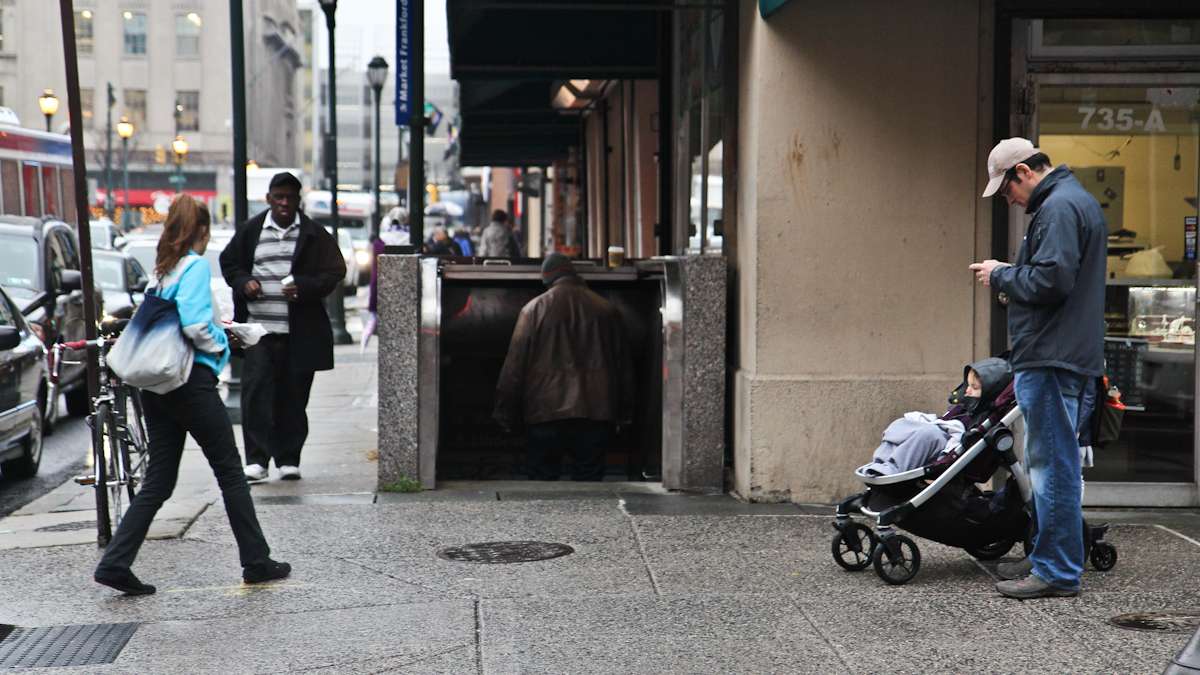Philly doc sees continued invasion of cellphone zombies
Listen-

-

-

-

-

-

-

(WHYY, file)
-

An orthopedic surgeon in Philly has been studying how often people get hurt while walking and using their phones. What he found may surprise you. Or not.
On a perfectly clear day this spring, Elizabeth Karnicki walked down Arch Street with her husband in the heart of Philadelphia’s Chinatown. The two were visiting from Texas, possibly attending a huge comic book convention nearby.
At 11th Street, their afternoon turned decidedly tragic. Just before 5:30 p.m., a Ride the Ducks tour boat struck Karnicki. A few minutes later, she was pronounced dead. She was 68.
A witness told police that the Duck Boat operator had a steady green light and that Karnicki had crossed against the red light in front of her.
Police said that a witness saw Karnicki using her iPad just before the fatal crash.
While shocking and sad, the rush-hour incident shined a spotlight on the not-so-hidden dangers of an extremely common sight: people using their cellphones and other devices as they walk down the street.
In a national survey released Wednesday by the American Academy of Orthopedic Surgeons, nearly 40 percent of respondents said they had personally witnessed a so-called “distracted walking incident,” which includes bumping into someone or something, tripping or falling, and being hit by a car while walking. And more injuries are being reported every year.
About a quarter of respondents said they had themselves been involved in a distracted walking incident. Most had simply bumped into something or fell down without being injured. Three percent reported breaking one or more bones.
On a wet Wednesday morning, Elon Tilmon was tapping away on her cellphone along Market Street before heading to class at the Pennsylvania Institute of Technology. She said she’s watched people nearly get hit by cars while texting or talking.
“I’ve bumped into people before,” said Tilmon. “I felt like an idiot.”
It’s why Jack Miller typically pulls over and stops on the sidewalk when he needs to shoot off an email. He’s also seen too many close calls, including one just two weeks ago.
“There was a young lady in front of me and the light turned and I just tapped her on the shoulder. She was startled someone tapped her, but it also kept her from being run over by a bus,” said Miller, who called the trend of people walking while using their cellphones a “significant problem.”
Miller is not the only one who thinks that. Nearly 80 percent of the survey’s respondents said they believed distracted walking is a “serious issue.”
“The reality is that we strongly believe this is going to be a substantially increasing problem over the course of the next several years because of how much people rely on their smartphones,” said AAOS spokesman Dr. Alan Hilibrand, an orthopedic surgeon at Thomas Jefferson University Hospital.
A study published in 2013 in the journal Accident, Analysis & Prevention, found that emergency department hospital visits for injuries involving distracted pedestrians on cellphones more than doubled between 2004 and 2010.
Nearly 70 percent of those injured were talking on their cellphones. About 10 percent were texting.
Dr. Lynn Kirby, an assistant professor with the Substance Abuse Research Center at Temple University, agrees with Hilibrand: This trend isn’t likely to change.
“It doesn’t seem to make a difference that people know that it’s bad and dangerous,” she said.
One of the reasons: Some may actually be addicted to their cellphones. To date, no one has studied cellphone addiction specifically, but Kirby said she certainly sees parallels with more traditional drug and alcohol addictions.
Dopamine is a naturally occurring chemical inside our brains that’s known as a neurotransmitter. Pleasurable experiences such as eating, sex, even tanning are triggers.
With cellphones, Kirby said some people might get addicted to a boost of dopamine they may get when they receive text message or even an email. Kirby said that explains part of the reason people get upset when they forget their cellphone or the battery is dead.
“You’re distressed. It’s upsetting. You might be depressed or anxious. There’s definitely a psychological dependence on the mobile phone. I think there’s no question about that,” said Kirby.
It’s why Hilibrand and the AAOS have launched an advocacy campaign with hopes of saving people from the emergency room, or worse. It uses a combination of social media and public service announcements on radio and television.
“There may not be much we can do from the perspective of trying to control it, but we can raise awareness that people are really putting themselves and others at risk by this behavior,” said Hilibrand.
WHYY is your source for fact-based, in-depth journalism and information. As a nonprofit organization, we rely on financial support from readers like you. Please give today.





